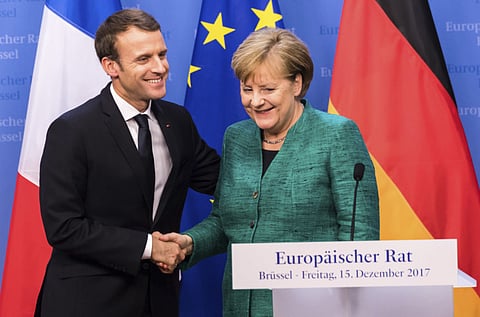Europe’s future in flux as 2017 comes to an end
2018 will be another critical year for the EU with debate over its future intensifying, given that Brexit talks could come to a close

European presidents and prime ministers concluded last Friday the last set piece summit of the EU political calendar. Formal ratification of the EU-UK first phase Brexit deal has made many of the headlines, but the meeting had an important wide-ranging agenda for the future of the continent, including proposed reforms to the Eurozone which could prove very significant.
The event capped off an extraordinary 2017 for the EU which has seen sentiment about its future ebb and flow in remarkable fashion. At the start of the year, many in Brussels feared the potential victories of Eurosceptical, far-right populist parties in France and The Netherlands. Yet, liberal centrists emerged victorious in both ballots, and there has been a spate of positive economic news to buttress this with the Eurozone economies recording improved growth.
The contrast with a year ago is stark, when the post-UK referendum mood music surrounding the EU was much more negative. However, the volatility of sentiment toward the continent has been underlined yet again in recent weeks by the failure of Angela Merkel — to date — to form a new government in Germany after September’s election which saw the rise of the far-right Alternative for Germany; and recent seccessionist political tensions in Catalonia in Spain.
In this fast changing environment, 2018 will be another critical year for the EU with key national elections, including in Italy; a potential conclusion of the Article 50 Brexit talks between the UK and the other 27 states; plus major internal projects like Eurozone reform. On the latter issue, EU leaders on Friday agreed to important new priorities for Eurozone integration, including the completion of a banking union and expansion of the role of the Eurozone bailout fund, while putting off contentious issues such as a budget for the currency area — an issue where there are key differences between important players like French President Emmanuel Macron, German Chancellor Angela Merkel, and European Commission President Jean-Claude Juncker. In this fast moving context, EU leaders in Brussels are seeking to steer and shape debate about the continent’s future with a view to finalising a vision that can potentially see Europe emerge stronger from the current challenges and opportunities facing it. And to help facilitate this, Juncker has outlined a number of key scenarios to try to forge consensus in 2018.
The scenarios range from the EU retreating, post-Brexit, to no more than the current economic Single Market which seeks to guarantee freedom of movement of goods, capital, services and people. At the other end of the spectrum, however, is a quite different future for the continent where the remaining 27 member states decide to do much more together, reigniting European integration which is favoured by Macron.
Yet, of the 5 scenarios, “Carrying on” is perhaps the most likely to be realised. This would see the EU muddling through from where it is today and seeking to deliver on the Bratislava Declaration agreed by all 27 non-UK member states last year. This manifesto includes better tackling migration and border security, beefing up external security and defence, and greater stress on enhancing economic and social development, especially for young people across the continent who have been badly impacted by the fall-out from 2008-09 international financial crisis, not least in countries like Spain and Greece.
However, further setbacks in coming years could instead see either a “Nothing but the single market” or “Doing less more efficiently” scenario come to pass. In either of these futures, the current scale of EU functions would be rolled back with attention and limited resources focused instead more on a smaller number of policy areas, including the single market.
A year ago, perhaps the least likely scenario to be realised by 2025 was the “Doing much more together”, however, some in Brussels are now more bullish on this, especially with the election of the strongly pro-EU Macron. This option would see all 27 remaining states sharing more power, resources, with decisions agreed faster and enforced much more quickly. Perhaps more likely, however, is the “Those who want to do more” scenario which would see more coalitions of the willing emerging in select policy areas to take forward the integration agenda on a flexible, rather than across-the-board basis. A model here could be the Eurozone itself where some 19 of the current 28 EU members have entered into a monetary union with the euro as the single currency.
One scenario that is, conveniently, left out is the worst-case of the bloc imploding. Nonetheless, given the build-up of challenges now facing it — which go well beyond Brexit — this outcome cannot be completely dismissed in the next decade.
Indeed, some 60 years after the Treaty of Rome, which was one of the EU’s founding treaties, European Council President Donald Tusk said in February that the threats facing the EU are now “more dangerous than ever”. This includes what he termed the new geopolitical reality for Europe that has witnessed an increasing assertive Russia and China, and instability in the Middle East and Africa which has driven a migration crisis. Intensifying this is the new uncertainty coming from Washington with President Donald Trump questioning much of the post-war tenets of US foreign policy, including broad-based support for European integration.
Taken overall, 2018 will be another massive year for the EU with debate over its future intensifying, especially given that the Article 50 Brexit talks between the EU and United Kingdom could come to an end before ratification of any final UK exit deal. Decisions in coming months, including over the Eurozone’s future, will define the longer-term economic and political character of the bloc well into the 2020s and potentially beyond.
Andrew Hammond is an Associate at LSE IDEAS at the London School of Economics.


